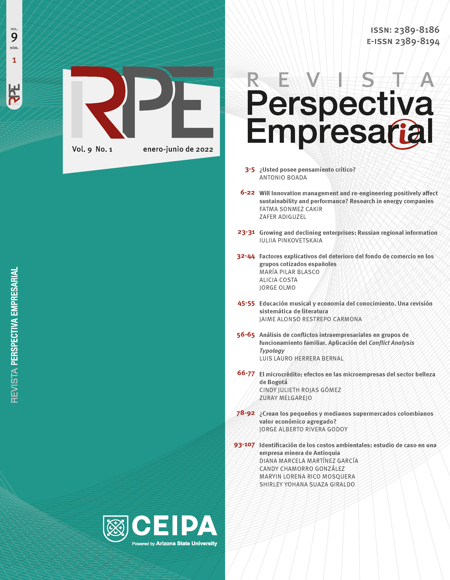Will Innovation management and re-engineering positively affect sustainability and performance? Research in energy companies
##plugins.themes.bootstrap3.article.main##
Failure in reengineering or innovation management will not only decrease the performance of the organization but also endanger its sustainability. Objective. To carry out a study on energy companies to investigate the importance of the subject. Methodology. The reason energy companies are selected for the research is that innovation and change come to the fore with the need for new energy sources. LISREL, SPSS 25 and SPSS PROCESS V.3 were used in the analyses. Results. As a result of the research, it can be said that innovation management in energy companies has a positive impact on both sustainability and performance. At the same time, both the independent and the mediation variable effect of reengineering is positive. Conclusions. Innovation and change are inevitable and can be explained as a result of research where positive results can be achieved if properly managed.
Downloads
##plugins.themes.bootstrap3.article.details##
Akbaba, Ö. (2016). Değişim Mühendisliği, Örgüt İklimi ve Psikolojik Sermayenin Firma Performansı Üzerine Etkisi: İstanbul Anadolu Yakası Aile Şirketleri Uygulaması. İstanbul, Turkey: Beykent University.
Aktan, C.C. (2003). Değişim çağında yönetim. Yakutiye, Turkey: Sistem Yayincilik.
Altinkemer, K., Ozcelik, Y. and Ozdemir, Z.D. (2011). Productivity and performance effects of business process reengineering: A firm-level analysis. Journal of Management Information Systems, 27(4), 129-162 DOI: https://doi.org/10.2753/MIS0742-1222270405
https://doi.org/10.2753/MIS0742-1222270405 DOI: https://doi.org/10.2753/MIS0742-1222270405
Antoncic, B. and Hisrich, R.D. (2001). Intrapreneurship: Construct refinement and cross-cultural validation. Journal of Business Venturing, 16(5), 495-527. DOI: https://doi.org/10.1016/S0883-9026(99)00054-3
https://doi.org/10.1016/S0883-9026(99)00054-3 DOI: https://doi.org/10.1016/S0883-9026(99)00054-3
Aydin, Y. (2019). Firma Performansinin Belirleyicileri: Bist-100 Endekste Yer Alan Firmalarindan Kanitlar. Avrasya Sosyal ve Ekonomi Araştırmalari Dergisi, 6(1), 65-78.
Bayyurt, N. (2007). İşletmelerde Performans Değerlendirmenin Önemi ve Performans Göstergeleri Arasındaki İlişkiler. Sosyal Siyaset Konferanslari Dergisi, 53, 577-592
Bititci, U.S. (2016). Managing business performance: The science and the art. New York, USA: John Wiley & Sons. DOI: https://doi.org/10.1002/9781119166542
https://doi.org/10.1002/9781119166542 DOI: https://doi.org/10.1002/9781119166542
Can, P. (2012). Pazarlama Süreçlerinin İnovasyon Stratejilerine Etkisi Üzerine Bir Araştırma. Yakutiye, Turkey: Atatürk Üniversitesi. https://doi.org/10.14230/joiss37 DOI: https://doi.org/10.14230/joiss37
Clayton, T. and Radcliffe, N. (2018). Sustainability: a systems approach. London, England: Routledge. DOI: https://doi.org/10.4324/9781315070711
https://doi.org/10.4324/9781315070711 DOI: https://doi.org/10.4324/9781315070711
Çankaya, S.Y. and Sezen, B. (2015). Moderator Effect of Environmental Uncertainty On the Relationship Between Ecologic Innovation and Sustainability Performance. International Journal of Management Economics and Business, 11(24), 111-134.
Damanpour, F., Walker, R.M. and Avellaneda, C.N. (2009). Combinative effects of innovation types and organizational performance: A longitudinal study of service organizations. Journal of Management Studies, 46(4), 650-675. DOI: https://doi.org/10.1111/j.1467-6486.2008.00814.x
https://doi.org/10.1111/j.1467-6486.2008.00814.x DOI: https://doi.org/10.1111/j.1467-6486.2008.00814.x
Doumeingts, G. and Browne, J. (Eds.). (2016). Modelling techniques for business process re-engineering and benchmarking. Berlin, Germany: Springer.
Dresner, S. (2008). The principles of sustainability. London, England: Earthscan.
Elçi, Ş. (2007). Herkesin İnovasyon Yapmasi Kaçinilmaz. Bursa Ticaret ve Sanayi Odası Bursa Ekonomi Dergisi, 227, 38
Erkorkmaz, Ü. et al. (2013). Doğrulayici faktör analizi ve uyum indeksleri. Turkiye Klinikleri Journal of Medical Sciences, 33(1), 210-223. https://doi.org/10.5336/medsci.2011-26747 DOI: https://doi.org/10.5336/medsci.2011-26747
Garvare, R. and Johansson, P. (2010). Management for sustainability - a stakeholder theory. Total Quality Management, 21(7), 737-744. https://doi.org/10.1080/14783363.2010.483095 DOI: https://doi.org/10.1080/14783363.2010.483095
Gibson, B., Hassan, S. and Tansey, J. (2013). Sustainability assessment: criteria and processes. London, England: Routledge. https://doi.org/10.4324/9781849772716 DOI: https://doi.org/10.4324/9781849772716
Goffin, K. and Mitchell, R. (2016). Innovation management: Effective strategy and implementation. New York, USA: Macmillan International Higher Education.
Hair Jr., J.F. et al. (2017). A primer on partial least squares structural equation modeling (PLS-SEM). Thousand Oaks, USA: SAGE Publications.
Hammer, M. (1990). Reengineering work: don't automate, obliterate. Harvard Business Review, 68(4), 104-112
Hammer, M. and Champy, J. (2009). Reengineering the Corporation: Manifesto for Business Revolution. Michigan, USA: Zondervan.
Hammer, M. and Stanton, S.A. (1995). Değişim Mühendisliği Devrimi. Yakutiye, Turkey: Sabah Kitaplari.
Hayes, A.F. (2009). Beyond Baron and Kenny: Statistical mediation analysis in the new millennium. Communication Monographs, 76(4), 408-420 https://doi.org/10.1080/03637750903310360 DOI: https://doi.org/10.1080/03637750903310360
İskenderoğlu, Ö. (2008). İşletmelerin Büyümesinde Büyüklüğün Etkisi: Türkiye İçin Bir İnceleme. Adana, Turkey: Nobel Kitabevi.
Javed, B. and Akhtar, S. (2012). Interrelationships between capital structure and financial performance, firm size and growth: comparison of industrial sector in KSE. European Journal of Business and Management, 15(4), 148-157.
Jovanoski, D., Malinovski, T. and Arsenovski, S. (2017). Links between strategic goals, information technology and customer satisfaction during business process reengineering. International Journal of Business Process Integration and Management, 8(3), 200-213. https://doi.org/10.1504/IJBPIM.2017.085399 DOI: https://doi.org/10.1504/IJBPIM.2017.10006322
Kanten, I.K. and Darma, G.S. (2017). Consumer Behaviour, Marketing Strategy, Customer Satisfaction, and Business Performance. Jurnal Manajemen Bisnis, 14(2), 143-165.
Küsbeci, P. (2013). İşletmelerde inovasyon yönetimi ve İstanbul ilinde sektörler arası ampirik bir çalışma. Istanbul, Turkey: Beykent Üniversitesi.
Lappalainen, J. and Niskanen, M. (2012). Financial performance of SMEs: Impact of ownership structure and board composition. Management Research Review, 35(11), 1088-1108. https://doi.org/10.1108/01409171211276954 DOI: https://doi.org/10.1108/01409171211276954
Linnenluecke, M.K. and Griffiths, A. (2010). Corporate sustainability and organizational culture. Journal of World Business, 45(4), 357-366. https://doi.org/10.1016/j.jwb.2009.08.006 DOI: https://doi.org/10.1016/j.jwb.2009.08.006
Lubin, D.A. and Esty, D.C. (2010). The sustainability imperative. Harvard Business Review, 88(5), 42-50.
Mazzarol, T., Reboud, S. and Volery, T. (2010). The influence of size, age and growth on innovation management in small firms. International Journal of Technology Management, 52(1-2), 98-117. DOI: https://doi.org/10.1504/IJTM.2010.035857
https://doi.org/10.1504/IJTM.2010.035857 DOI: https://doi.org/10.1504/IJTM.2010.035857
Riyanto, A., Primiana, I. and Azis, Y. (2018). Reengineering support for competitive advantage through organizational basis, information and communication technology: a literature review. Problems and Perspectives in Management, 16(3), 464. https://doi.org/10.21511/ppm.16(3).2018.37 DOI: https://doi.org/10.21511/ppm.16(3).2018.37
Robertson, M. (2017). Sustainability principles and practice. New York, USA: Taylor & Francis. DOI: https://doi.org/10.9774/gleaf.9781315625478
https://doi.org/10.9774/gleaf.9781315625478 DOI: https://doi.org/10.9774/gleaf.9781315625478
Schaltegger, S. and Wagner, M. (2011). Sustainable entrepreneurship and sustainability innovation: categories and interactions. Business Strategy and the Environment, 20(4), 222-237 https://doi.org/10.1002/bse.682 DOI: https://doi.org/10.1002/bse.682
Schot, J. and Steinmueller, W.E. (2018). Three frames for innovation policy: R&D, systems of innovation and transformative change. Research Policy, 47(9), 1554-1567. https://doi.org/10.1016/j.respol.2018.08.011 DOI: https://doi.org/10.1016/j.respol.2018.08.011
Shen, C.W. and Chou, C.C. (2010). Business process re engineering in the logistics industry: a study of implementation, success factors, and performance. Enterprise Information Systems, 4(1), 61-78. DOI: https://doi.org/10.1080/17517570903154567
https://doi.org/10.1080/17517570903154567 DOI: https://doi.org/10.1080/17517570903154567
Smith, M. et al. (2008). Factors influencing an organisation's ability to manage innovation: a structured literature review and conceptual model. International Journal of Innovation Management, 12(04), 655-676. DOI: https://doi.org/10.1142/S1363919608002138
https://doi.org/10.1142/S1363919608002138 DOI: https://doi.org/10.1142/S1363919608002138
Solow, R.M. (2019). Sustainability: an economist's perspective. In Stavins, R.N. (Ed.), Economics of the Environment (pp. 505-513). New York, USA: W.W. Norton.
Sonmez Cakir, F. and Adiguzel, Z. (2020). Analysis of Leader Effectiveness in Organization and Knowledge Sharing Behavior on Employees and Organization. SAGE Open. Recovered from https://journals.sagepub.com/doi/10.1177/2158244020914634. https://doi.org/10.1177/2158244020914634 DOI: https://doi.org/10.1177/2158244020914634
Sönmez Çakir, F. (2020). Kismi en küçük kareler yapısal eşitlik modellemesi SmartPLS 3.2. Uygulamalari. Ankara, Turkey: Gazi Kitabevi.
Thomas, J.R., Nelson, J.K. and Silverman, S.J. (2015). Research methods in physical activity. San Francisco, USA: Human Kinetics.
Tidd, J. and Bessant, J. (2018). Innovation management challenges: From fads to fundamentals. International Journal of Innovation Management, 22(05), 1840007 https://doi.org/10.1142/S1363919618400078 DOI: https://doi.org/10.1142/S1363919618400078
Top, S. (2008). İşletmelerde yenilik ve yaraticilik yönetimi. Istanbul, Turkey: Beta Basim Yayim Dağitim AŞ.
Tukker, A. et al. (Eds.). (2017). System innovation for sustainability 1: Perspectives on radical changes to sustainable consumption and production. London, England: Routledge. https://doi.org/10.4324/9781351280204 DOI: https://doi.org/10.4324/9781351280204
Uzkurt, C. (2010). 2010). onomist's perspective. İnovasyon yönetimi: inovasyon nedir, nasil yapilir ve nasil pazarlanir? DOYSA, 39, 36-51.
Zahra, S.A., Neubaum, D.O. and El-Hagrassey, G.M. (2002). Competitive analysis and new venture performance: Understanding the impact of strategic uncertainty and venture origin. Entrepreneurship Theory and Practice, 27(1), 1-28 https://doi.org/10.1111/1540-8520.t01-2-00001 DOI: https://doi.org/10.1111/1540-8520.t01-2-00001



































